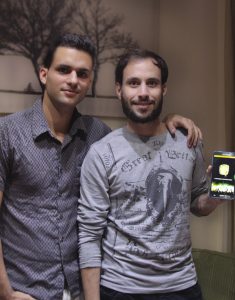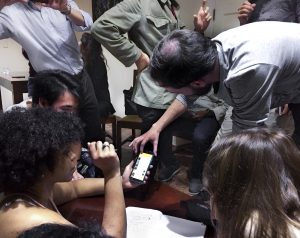By Despina Leontiadis

HAVANA – During the day, Sergio Leon Gonzalez, 25, teaches telecommunications at the Ciudad Universitaria José Antonio Echeverría, Havana’s leading technical college. Evenings, he spends at his laptop, updating and finessing a smartphone app that he and a partner have created, part of a tiny tech sector emerging in Cuba.
Gonzalez said he regularly clocks 16- to 18-hour workdays between his teaching and developing, a grueling schedule complicated by limited access to the Internet. His partner, Juan Louis, 23, a CUJAE student, described the conditions they work under.
“I’ll sit outside on the curb just to access a (WiFi) hotspot to work from,” Louis said during an interview.
Their Android app, Ke Hay Pa’Hoy, a colloquial Spanish phrase meaning “What’s happening tonight,” offers information about cultural events in Havana.
Gonzalez said Ke Hay Pa’Hoy is among 10 to 15 phone apps that entrepreneurs have launched so far in Cuba, including A La Mesa, a restaurant directory, and Cunove Cuba, a sort of Craigslist.
The tech sector is emerging as Internet service is slowly being introduced to Cuba. In July, the government established 50 public WiFi hotspots where people can access the Internet by buying codes for the equivalent of $2 for an hour of service. That’s high in a country where the average salary is about $20 a month.
To work around these limitations, Louis and Gonzalez said they had developed a system that allows users to update the app without logging into the Internet. Two to three times a week, users are emailed a 60KB file containing information about the latest events. They receive the file through their mobile data plan and then download it to the app.
Opportunities exist because social media apps popular elsewhere have not taken hold.
“Apps like Twitter and Snapchat never picked up in Cuba,” Louis said. “Because of rapid posting, it’s difficult to use them here.”
The entrepreneurs hope to someday allow the app to operate more smoothly. “We’re always updating as infrastructure gets better,” said Louis, adding that the app will soon include vector maps with geo-positioning to help users locate the events closest to them.
Ke Hay Pa’Hoy allows users to filter by date and type of event to cater more closely to their individual interests. Gonzalez said he and Louis work closely with the Ministry of Culture to fill the app’s calendar. Ke Hay Pa’Hoy also has connections to popular restaurants and venues to learn of events they are hosting in Havana.

According to Gonzalez, Ke Hay Pa’Hoy has been downloaded 6,000 times and has received 1,427 “likes” on its Facebook fan page as of the publication of the article. Based on the app’s Facebook page, 70 percent of users are in Cuba and 80 percent of users are 18 to 34, he said.
“We’re just focused on growing first,” Gonzalez said. “Our main goal is to continue making relationships and signing contracts to increase the number of events on the calendar.”
Gonzalez and Louis are hopeful that they can grow the app’s reach even though many young adults are leaving Cuba to pursue careers abroad, fearful that they cannot accomplish much professionally in their own country.
Referring to young people leaving Cuba, Gonzalez said: “It takes courage to go after something you’ve been told about that you don’t really know about, but it also takes courage to stay.”
Both Louis and Gonzalez said they felt strongly about leaving their mark on a rapidly changing Cuba, proud to be part of a group of young professionals contributing to a home-grown tech movement.
“I want to do what I love, but I want to do it in Cuba,” Louis said.